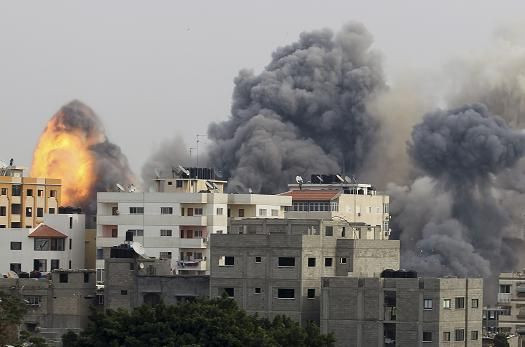Israel-Gaza Attacks Continue As Clinton Meets Netanyahu

Israeli air strikes continued against the Gaza Strip and Palestinian rockets struck Israel as U.S. Secretary of State Hillary Clinton held talks in Jerusalem into the early hours of Wednesday, seeking a truce that would hold back Israel's ground troops.
Hamas, the Islamist movement controlling Gaza, and Egypt, which is trying to broker a truce, had floated hopes for a ceasefire Tuesday afternoon, but by the time Clinton met Israeli Prime Minister Benjamin Netanyahu it was clear there would be more argument, and more bloodshed, first.
Hamas leaders in Cairo accused Israel of failing to respond to proposals and said an announcement on holding fire would not come before dawn Wednesday, Reuters reported. Israel Radio quoted an Israeli official saying a truce was held up due to "a last-minute delay in the understandings between Hamas and Israel."
Spokesman Sami Abu Zuhri said Hamas was waiting for Israel’s response to a cease-fire proposal, the Jerusalem Post reported. He said the Egyptian presidency would announce any cease-fire agreement when and if it was reached.
In the meantime, Hamas and other Palestinian groups would continue to respond to Israeli “crimes,” he said.
Clinton, who flies to Cairo to see Egyptian President Mohamed Morsi later Wednesday, spoke of a deal "in the days ahead."
As she arrived in Israel after nightfall, leaving an Asian summit she was attending in Cambodia with President Barack Obama, Israel was stepping up its bombardment. Artillery shells and missiles from naval gunboats slammed into the territory and air strikes came at a frequency of about one every 10 minutes.
At United Nations, ambassadors announced Tuesday night that the Security Council will hold an open debate on the Gaza crisis on Wednesday afternoon if a ceasefire is not called before then, the Australian Associated Press reported. The open debate would break a week of silence in the council.
After hours of closed-door meetings in the council on Tuesday, the ambassadors of India, Morocco and the Palestinian Authority all emerged to announce the council had agreed to the debate.
The move comes after the United States blocked adoption of a unanimous press statement from the council because it did not explicitly criticize Hamas's rocket attacks on Israel.
After seven days of hostilities that have killed more than 130 Palestinians and five Israelis, both sides are looking for more than a return to the sporadic calm that has prevailed across the blockaded enclave since Israel ended a much bloodier air and ground offensive four years ago.
Netanyahu told Clinton he wanted a "long-term" solution, Reuters reported. Failing that, he made clear, he stood ready to step up the military campaign to silence Hamas's rockets. But he has seemed in no hurry to launch the threatened ground invasion.
Hamas has demanded an easing of Israel's blockade on the 40-km (25-mile) slice of Mediterranean coast that is home to 1.7 million people. It may count on some sympathy from Morsi, though Egypt's first freely elected leader, whose Muslim Brotherhood inspired Hamas's founders, has been careful to stick by the 1979 peace deal with Israel struck by Cairo's former military rulers.
Medical officials in Gaza said 31 Palestinians were killed on Tuesday. An Israeli soldier and a civilian died when rockets exploded near the Gaza frontier, police and the army said.
Gaza medical officials say 138 people have died in Israeli strikes, mostly civilians, including 34 children. In all, five Israelis have died, including three civilians killed last week.
On the seventh day of its offensive on Gaza, the Israel Defense Force stepped up its attacks on strategic targets across the area. In what appeared to be a last-minute burst of heavy fire, Israeli tanks, artillery forces, fighter jets and helicopters intensified the strikes.
Artillery fire primarily targeted northern Gaza, Israel’s Ynet News reported. The army struck a Hamas command center, a bank and an apartment the IDF said was used as a military hideaway.
Tunnels used to store munitions and smuggle fuel were also targeted, as were several weapon factories and caches. The smuggling tunnels are one of Hamas' most critical sources of financing, the army said.
IAF aircraft continued to bomb Palestinian units attempting to fire rockets and anti-tank missiles, as well as other operatives across Gaza.
Palestinian emergency services told Al Jazeera that two brothers in the southern town of Rafah were killed in a strike that hit their motorcycle Tuesday night. Four others were killed in raids around the central town of Deir al-Balah, they added. Earlier, two cameramen from Al-Aqsa TV were among six people killed in Israeli attacks on the Gaza Strip.
A long-range rocket fired from Gaza slammed into a seven-story building in Rishon Lezion, near Tel Aviv, Tuesday night, leveling apartments on the top two floors and left a layer of shattered glass, concrete dust and shrapnel covering the street below, the Jerusalem Post reported.
No one died, the strike was the most serious in Israel’s populated center since the conflict began, and represented the first successful rocket hit on the Tel Aviv area during the current round of hostilities. Six people were slightly wounded.
© Copyright IBTimes 2024. All rights reserved.





















